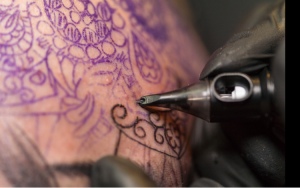Tattoos were once seen to be symbols of defiance, worn by sailors, rock stars, and outsiders alike. Ink is now ubiquitous in the modern world. Tattoos have gone mainstream, with anything from tiny, delicate initials hidden behind an ear to full-back murals of shirtless wizards battling dragons (yes, really).
However, just as society has become increasingly accepting of body art, new study raises concerns. A recent study from the University of Southard in Denmark reveals that tattoos may raise the risk of some types of cancer, including skin cancer and lymphoma.

Yes, the same ink that graces your favorite phrase or your dog’s paw print could potentially pose a health concern. The emphasis is on potentially.
The study isn’t the typical “we surveyed 100 people” type of research. Twin studies are one of the most potent designs in scientific research since they share DNA and, in many cases, early-life circumstances. Researchers went through health data, comparing twins who got tattoos and those who did not. As you can expect, this needed a significant amount of time, patience, and possibly a lot of awkward family interviews.
What they discovered was startling: tattooed people appeared to have an increased risk of acquiring cancer, particularly in regions such as the lymph nodes and skin, where tattoo ink tends to deposit.
More concerning, those with larger tattoos (those larger than the palm of a hand) were shown to be two to three times more likely to get these cancers than their non-tattooed or minimally inked peers.
Not yet, and perhaps not ever. The researchers were careful to point out that the study did not prove a direct cause-and-effect link between tattoos and cancer. In other words, having a tattoo does not mean you will develop cancer. What this means is that this could be a piece of a much broader jigsaw that warrants more investigation.
It’s also possible that the connection is indirect. For example, people with tattoos may have other risk factors, such as spending more time in the sun without sunscreen, smoking cigarettes, or engaging in other lifestyle habits that enhance their cancer risk.
The researchers discovered that tattoo ink contains thousands of microscopic chemical particles, some of which can move through the body and settle in lymph nodes. That alone may not be dangerous, but it is worth investigating more, especially since tattoo ink is not as strictly controlled in many countries as food or cosmetics.
For the time being, this study functions as a warning light rather than a fire alarm. It is a call to action for scientists and public health professionals to delve further. More research, larger populations, longer follow-ups, and more stringent controls will be required before any firm conclusions can be reached.
If you already have tattoos, don’t worry. The risk, if it exists at all, appears to be low. However, it may be worth considering where and how you receive your tattoos, the inks used, and whether they are from trustworthy sources using safe, tested chemicals.
And if you’re currently having a massive combat scene tattooed over your back, don’t worry – your tattoo artist is still working on the highlights of the wizard’s six-pack.
Tattoos are a deeply personal and artistic form of self-expression, and they hold special value for many people. This new Danish study does not recommend that you stop having tattoos, but it does imply that we should pay more attention to what is in that ink, how it is utilized, and what it may be doing to our bodies over time.
Wear sunscreen, schedule regular health checkups, and reconsider getting a full-body dragon tattoo. At least until science finds some more answers.
